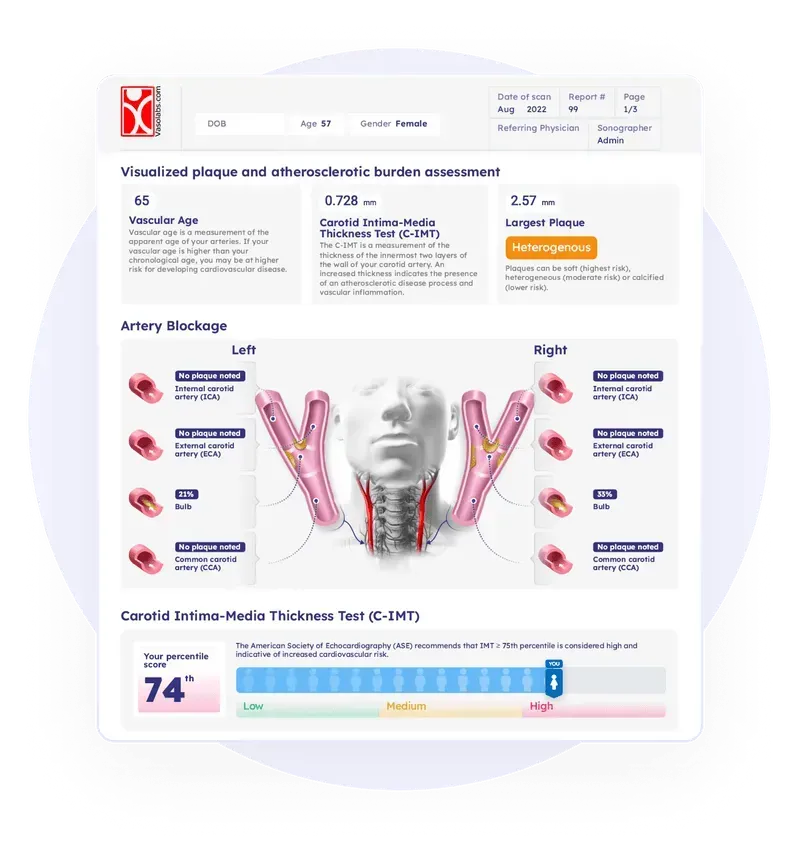801-797-2297
1414 South 600 West, Bountiful, UT 84010
Mon-Friday, 8am-5pm
801-797-2297 | Mon-Friday, 8am-5pm
Welcome to Our Blog: Vasolabs News and Education

Clinical Context for Carotid IMT: Understanding the Data and What It Means for Athletes
Give Athletes Some Slack: What Carotid IMT Data Tells Us
When assessing Carotid Intima-Media Thickness (IMT) in athletes, it’s essential to provide context to the numbers. IMT is a measure of the thickness of the inner layers of the carotid artery, and while it can indicate cardiovascular health, it doesn't always tell the full story—especially in highly active individuals.
Is the IMT Looking Healthy?

A healthy carotid IMT shows unbroken, intact arterial layers with no fatty streaks or deposits. For most individuals, a thin and smooth IMT is a positive indicator of heart health. However, for athletes, a slightly thicker IMT may not be cause for concern, as long as the arterial walls remain unbroken and smooth.
Stay Out of the Red Zone (Graph Reference)

The IMT graph used in these reports is derived from the ARIC study, which followed 10,000 people over 10 years to develop "normal" values based on the American population in the 1990s. It's important to note that this study did not distinguish between athletes and non-athletes.
Setting Expectations for Carotid IMT
It’s essential to manage expectations when reviewing IMT data.
For instance:
Vascular surgeons consider intervention (endarterectomy) only at 70% occlusion.
Hospitals typically report plaques starting at 30-39% blockage as "mild."
Previously, anything under 0.6mm was considered ‘good’ in IMT reports, but now, anything under 0.8mm is acceptable as long as the arterial lining remains intact.
What About Athletes?
Athletes often show a thicker IMT due to their higher levels of physical activity. However, this does not automatically signal risk, as long as the arterial lining is smooth and free from fatty streaks.
The Caves-Cafe Study: A Key Source for Mortality Data
One of the most influential studies on Carotid IMT was the Caves-Cafe study, which tracked over 10,000 people for 10 years. This study provided critical data that allows us to categorize patients based on their plaque levels and IMT thickness.
A Dynamic Artery: The IMT “Walk” Effect
The IMT is dynamic. It exchanges nitric oxide with the blood and signals dilation during exercise, changing 7-13% throughout the cardiac cycle. This "walk" effect makes the IMT more flexible in children and athletes, something we aim to measure in future reports at Vasolabs.
My Experience: Carotid IMT, Athletes, and Risk
Through extensive research and personal intuition, I’ve found that when the IMT surpasses 0.8mm, the risks for heart issues begin to rise. In high-risk cases, studies have shown that the IMT layers can become visibly broken or lumpy, underscoring the need for caution.
To illustrate this point, I’ll share a personal experience: my son, a college rugby player, has an IMT near 0.6mm. Despite his athleticism and rigorous workouts, his arterial lining remains unbroken, indicating good heart health.
Conclusion: The Significance of IMT for Athletes
The take-home message is this: for athletes, a thicker IMT may be a natural physiological response to regular physical activity. As long as the arterial walls remain smooth and intact, this thickness is not a red flag. However, consistent monitoring through tools like the Carotid IMT scan is crucial to ensure heart health remains on track.
References:
Golbidi, S., & Laher, I. (2016). Obesity and heart failure: A narrative review. Cardiovascular Diabetology, 15(1), 16. https://doi.org/10.1186/s12933-016-0336-2
Kargl, J., & Müller, J. (2015). The role of inflammation in atherosclerosis and its implications for prevention and therapy. PMC4592756. https://pmc.ncbi.nlm.nih.gov/articles/PMC4592756/
Eberhardt, R. T., & Waksman, R. (2001). Carotid artery disease: Diagnosis and treatment. PubMed Central, 11395035. https://pubmed.ncbi.nlm.nih.gov/11395035/
Why should you get this C-IMT scan?
Informed patients make better decisions.

Early Detection of Heart Disease Risk
A C-IMT scan can act as an early warning system by identifying increased thickness in the artery walls long before any symptoms of heart disease or stroke become evident.

Personalized Treatment Plan
The results of a C-IMT scan can help your doctor tailor a treatment plan to reduce your risk of heart attack or stroke, which is the leading cause of death and disability in the world.

Non-Invasive and Safe
Unlike some other tests, the C-IMT scan is non-invasive and uses ultrasound, not radiation. It's safe and doesn't require any special preparation.

Family History
If you have a family history of early heart disease or stroke, the scan can provide valuable information about your own risk, helping you and your doctor to take preventive measures.

Peace of Mind
If you are anxious about your cardiovascular health, a vasometric scan can provide reassurance if your results are within a normal range.
Vasolabs Is A Premier Provider Of Safe, Convenient Heart Disease Screenings.
Vasolabs Is A Premier Provider Of Safe, Convenient Heart Disease Screenings.
Uses the newest ultrasound technology
Determines whether or not you have heart disease
Pain-free. Requires no wires, treadmills, or needles.
Takes only 15 minutes
Get your Easy-to-Understand Report within 24 hours
Optional Discussion with your Clinician
Schedule a test to see if you’re at risk of heart disease!
Identify Your Risks of Getting Cardiovascular Disease With a Simple C-IMT Scan!
Know if You Are at Risk for Heart Attacks, Strokes, and other Cardiovascular Diseases:
$499 $249
What's Included in your Report:
See your Vascular Age!
Soft or Calcified Plaque is visualized, you’ll see it all.
Track Your inflammation, Know your Artery Blockage.
Informed patients make better decisions.
Loved ones depend on you.
Do I Need a Heart Screening?
Here is a checklist of factors that put you at elevated risk for heart attack, stroke, and other forms of cardiovascular disease:
Over 40 years of age
Family history of heart disease/stroke
Overweight
Increased cholesterol level
High-fat diet
Tobacco user
High blood pressure
Diabetic
Metabolic syndrome
Erectile dysfunction
Psoriasis

Peace of Mind is Priceless

Looking back, it's chilling to realize how close I came to the edge. I opted for a test at Vasolabs on a whim, without any particular symptoms. Boy, am I glad I did! Turns out, my arteries were nearly clogged up - something regular doctors wouldn't have caught unless there were signs of a problem. By the time I got a couple of second opinions and returned to my regular doctor, my arteries were 95% blocked. If I hadn't taken the test when I did, I could have had a stroke. Trust me when I say this, going to Vasolabs was one of the best decisions I've ever made.
- George B

I was really worried about getting a heart attack because its already happened in our family. So taking this test gave me the peace of mind I was looking for. And it was so cool to see the age of my artery was younger than I was!!
- Barbara L.

I went to Vasolabs for their C-IMT testing, thinking it'd be a complicated deal, but nope! It was as easy as getting a photo taken. And guess what? They found an issue that could've been a silent threat. Thanks to them catching it early, my doctor and I are on top of it now. Honestly, I feel like I dodged a bullet. Big thumbs up for Vasolabs!
- Walter S.

I saw an ad on Facebook and I got the C-IMT Test for myself and my husband, it was such an easy process. And a great gift idea for family. It was really fun to look at the results and good to know I need to work on my health.
- Jessica F.
Frequently Asked Question
What is a C-IMT scan?
A C-IMT Scan is a non-invasive procedure that uses ultrasound technology to measure the thickness of your carotid arteries' walls. These arteries, located on each side of your neck, supply blood to your brain. Over time, plaque can build up in these arteries, causing them to thicken. This is often an early sign of atherosclerosis, a disease that can lead to serious conditions such as heart attacks and strokes.
Where do I go to get this scan?
For your quick, 15-minute appointment, simply head over to our facility located at 1414 South 600 West, Bountiful, UT 84010.
Who takes my test?
Dean Ence, an expert sonographer, will be handling your fast, no-pain test to figure out the 'age' of your arteries. This test checks how thick your artery walls are - thicker walls can mean inflammation. It's all simplified for you to understand easily. We also spot and show plaque, whether soft or hard, in your arteries. You get detailed pictures from the ultrasound for your records. Taking care of your health is our main goal!
How long does the C-IMT Scan and Report take?
The duration of the C-IMT scan can vary depending on various factors, like the complexity of the patient's condition. Typically, a Vasometric scan takes around 15 minutes to complete. The report is done and delivered within 24 hours to you.
Will my insurance cover this C-IMT Scan?
No. Hospitals charge $800, but our cost is $249.
Our Mission:
Vasolabs is dedicated to promoting heart health by providing innovative, easy-to-access tests. We empower people with insights into their vascular health for early risk detection.

